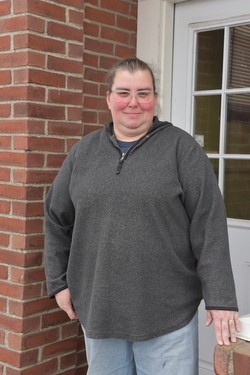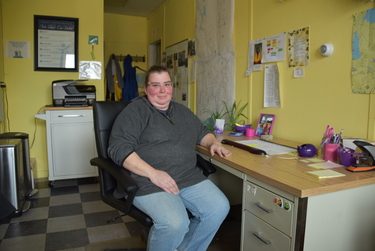Creating a PATH out of homelessness

“We go to where they are. They don’t come to us,” she says.
Janice is the coordinator of PATH or Projects for Assistance in Transition from Homelessness. A program of Catholic Charities Maine, it is intended to reach those suffering from mental illness who are also homeless.
“We’re looking for folks who are not connected to services to try to establish relationships and work with them to the point of being able to refer them to local resources for services and support. Part of the process, obviously, includes housing,” says Janice. “These are very challenging situations. It’s extremely rare that someone is not housed simply because they don’t have a roof over their head.”
PATH is funded by grants awarded to states by the federal government. The Catholic Charities’ program receives additional support from the annual Catholic Appeal.
Catholic Charities offers services in five counties: Androscoggin, Franklin, Oxford, Sagadahoc, and part of Cumberland. It is a lot of area to cover for the staff of three full-timers and one part-timer.
Janice say the initial challenge is finding those who homeless. Much of the area they serve is rural, where homelessness tends to be more hidden.
“The idea that people have of what homelessness looks like is predicated on an urban homelessness model, and most of our places are not urban, and they don’t follow that model. You don’t see people sleeping on the streets,” she says. “How you approach the problem, where you find the problem, how you define the problem, it’s all different in a rural setting. People tend to, even if they’re sleeping outside, they will be in driveways down dirt roads, in the woods. You’re not going to see them. People will camp out at campgrounds for the summer and things like that.”
She says referrals come from many places, including from folks who are indirectly providing services, for instance libraries, where the homeless may spend time.
Even when initial connections are made, Janice says it takes a while to build trust. It is why she and her fellow staff members spend most of their time in the community.
“The focus, especially in the beginning, is the relationship we can establish with people, because it’s those relationships that enable us to help the person,” she says. “It’s spending time in the communities so people can become familiar with you and accept you as part of the community. How quickly or how slowly it goes is kind of based on the individual.”
She says going to the people also puts them more at ease than they would be in an office setting.
“Because we go to them and they don’t have to come to us, there is a lot less pressure involved, so we hear more of their stories,” she says. “We can sit with them for however long we need to and just let the story unfold and then take it from there.”
Janice says their clients have different needs, but connecting them with case management is key because it opens the door to other services.

Janice says, unfortunately, there are both personal and systemic barriers that must be overcome. Many have experienced trauma in their lives. Some may have been in the mental health system but dropped out because of a bad experience. Some may no longer have needed identification cards. Some may not be eligible for MaineCare, and even if they have private health insurance, it may not cover the cost of case management. Some may be struggling with cooccurring issues such as substance abuse.
“To be part of this program, sobriety is not required. We encourage it because we tell people that sobriety makes it easier to follow through on some of these things,” she says. “For a lot of our folks who have substance abuse issues, being accepted and sitting down and talking with them can be the first step to actually establishing that relationship that is needed to help them.”
Because of their personal struggles, it is not uncommon for people to start the program and then not follow through. Janice says, even if they close a case, they are always willing to try again.
“I do believe that, generally speaking, people are very serious and legit when they say they want to do this, but with being in survival mode, it can be hard for them to sustain that,” she says.
Catholic Charities has six months to work with each client, which is sometimes tight. The number of cases can dip to 10 or 15 or rise to more than 30. Janice estimates that since Catholic Charities’ PATH program started five years ago, they have connected with 450 to 500 people, ages 18 and up. While most clients are in their mid-30s to mid-50s, she says some are seniors, including one client who was age 83.
While the work isn’t easy, Janice says she loves what she does because she has always felt a call to help others.
“Something about me, people tend to tell me a lot of things and share their life stories,” she says.
Janice says she is also motivated by her own experiences. Her mother struggled with mental illness.
“When I was in college, things got really bad for my mom, and we had to deal with a lot of crisis-type situations and hospitalizations. This was back in New York, so big systems. And, as a result of the challenges we went through with that, and some of the places she landed, and trying to figure out how to help her, I realized at a pretty young age that if it wasn’t for me and my big mouth, my mom would have landed in some pretty awful situations. So, I decided I wanted to go to grad school for social work.”
She says her goal has always been to do public advocacy work for people with mental illness, which is why she enjoys her job at PATH so much.
“I look forward to coming to work all the time,” she says. “I realize that it’s really an honor to have people share their stories with me, and then, being able to reconnect them with humanity is really nice.”
She says it’s a ministry that fits in well with the mission of Catholic Charities.
“We’re helping the most vulnerable, the ones without a voice, the people who need the most help, who society would prefer to pretend don’t even exist,” she says. “It’s the work we’re supposed to be doing. It just is.”










